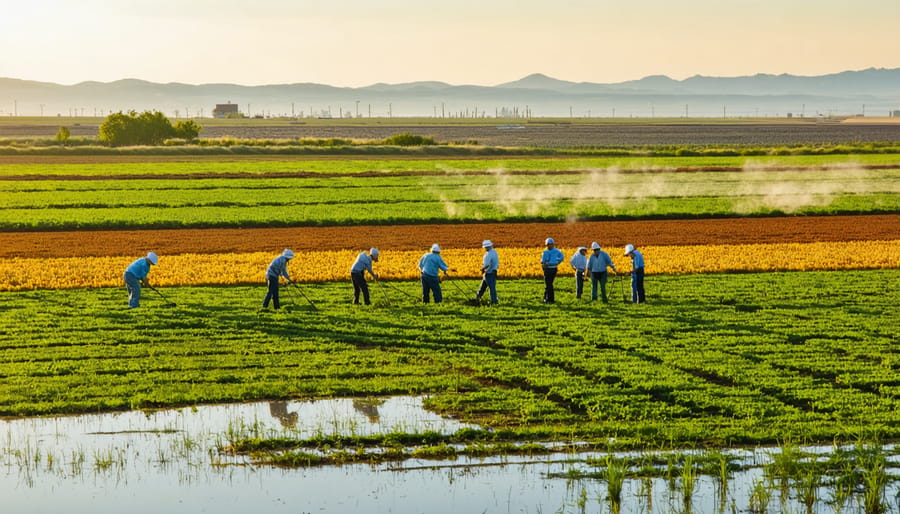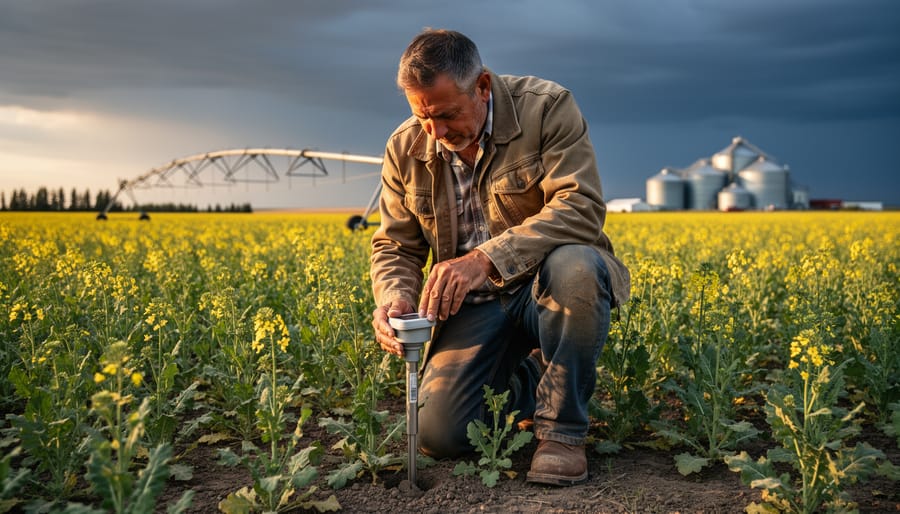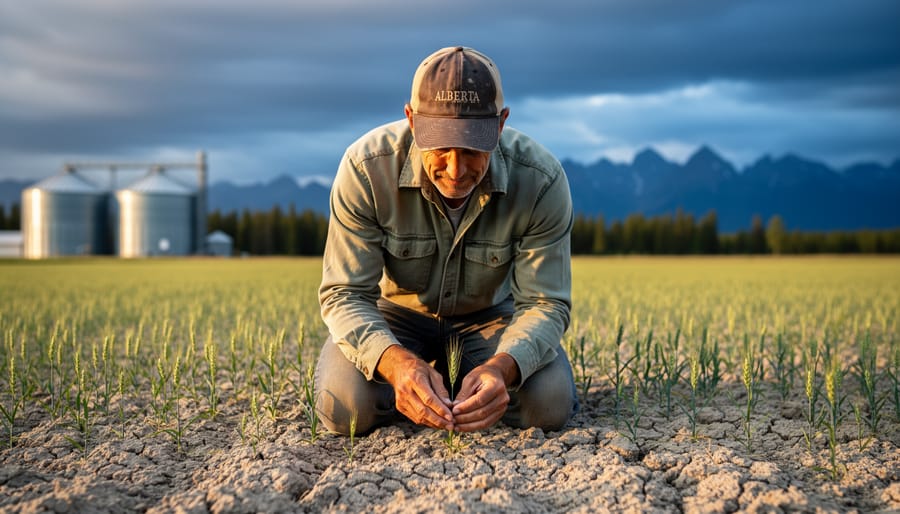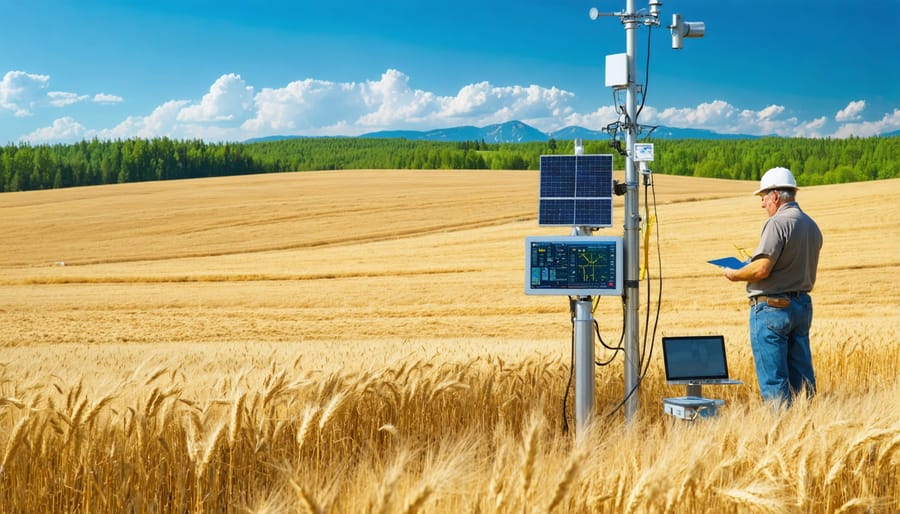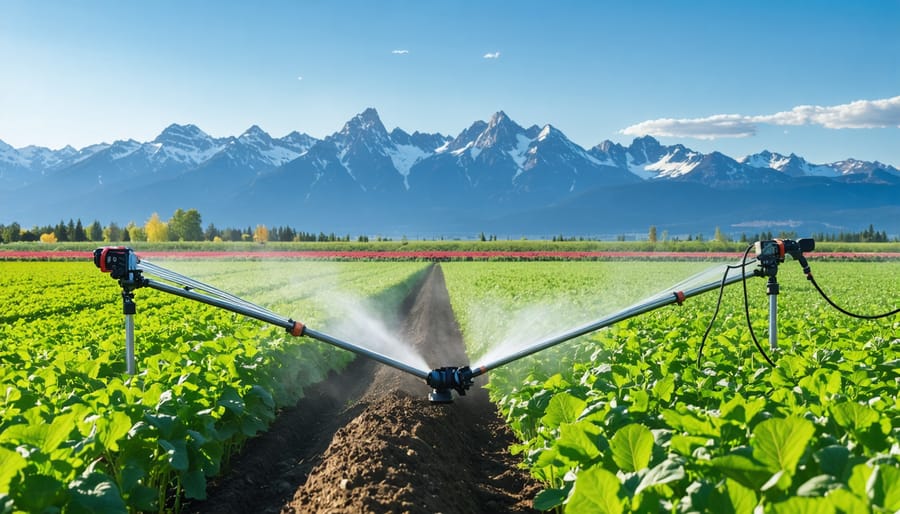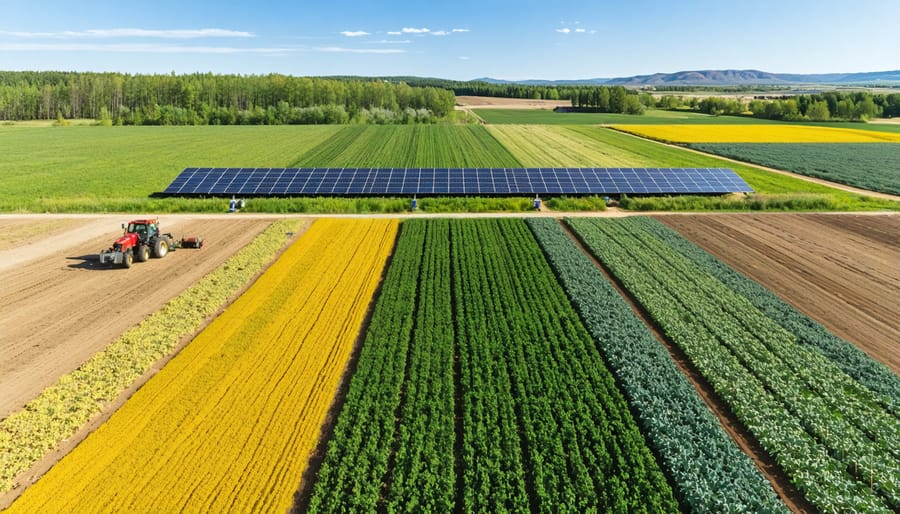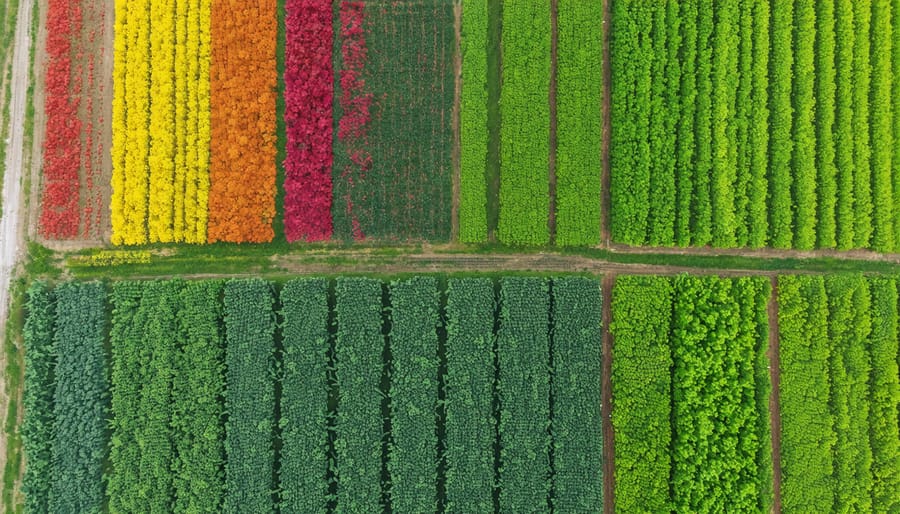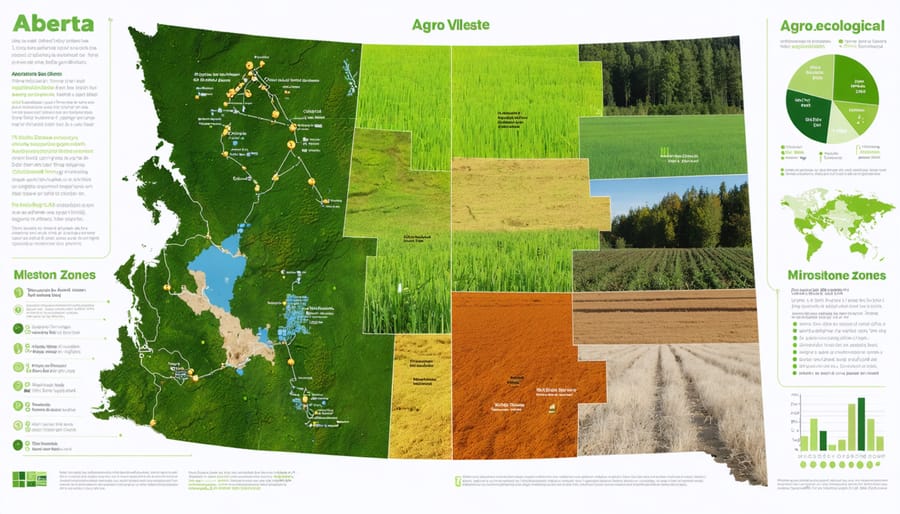Transform conventional farmland into thriving eco-agricultural systems by implementing regenerative practices that boost soil health while maintaining profitable yields. Recent studies in climate adaptation in Canadian agriculture demonstrate how integrated pest management, cover cropping, and precision irrigation can reduce environmental impact while increasing farm resilience.
Alberta’s agricultural sector stands at the forefront of sustainable innovation, where farmers combine traditional knowledge with cutting-edge technology to create robust, environmentally conscious farming systems. By adopting these practices, producers across the prairie provinces have reduced chemical inputs by up to 40% while maintaining or improving crop yields.
The shift toward eco-agriculture isn’t just environmentally crucial—it’s economically vital. With rising input costs and increasing market demand for sustainably produced foods, farmers who embrace these methods position themselves for long-term success. Through collaborative research networks and community-based learning initiatives, Alberta’s agricultural communities are building a blueprint for sustainable farming that works in real-world conditions.
How Alberta’s Farming Communities Are Leading Climate Innovation
The Power of Farmer-to-Farmer Networks
In Alberta’s farming communities, the strength of peer-to-peer learning networks has proven instrumental in advancing sustainable agricultural practices. Through successful community initiatives, farmers are sharing knowledge and experience that’s uniquely tailored to local conditions.
The Southern Alberta Conservation Connection, comprising over 200 farmers, demonstrates this approach in action. Members regularly host field days and workshops, sharing insights on soil health practices and water conservation techniques. Their mentorship program has helped 45 farms transition to regenerative practices in the past three years.
In Central Alberta, the Red Deer River Watershed Alliance’s farmer network has pioneered a collaborative approach to riparian management. Their monthly “Kitchen Table Talks” bring together experienced and new farmers to discuss practical solutions for sustainable land management.
These networks have shown that when farmers learn from each other, adoption of eco-agricultural practices increases significantly. The success rates are particularly high because solutions are tested and proven in local conditions, building confidence in implementation while maintaining strong community bonds.
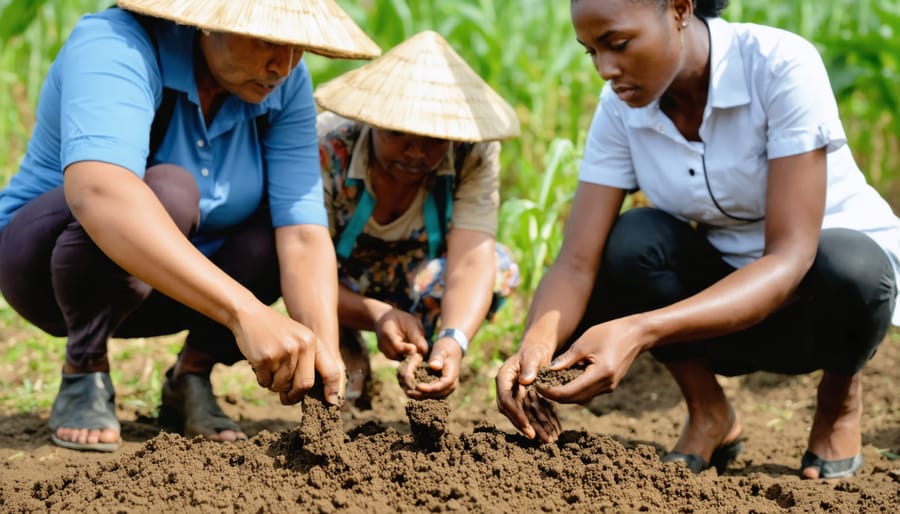
Local Knowledge Meets Modern Science
In Alberta’s farming communities, the marriage of traditional knowledge and modern science is creating remarkable results. Third-generation farmer Sarah Thompson from Lacombe combines her grandfather’s soil management techniques with precision agriculture technology, resulting in a 30% increase in soil organic matter over five years. Her approach includes integrating Indigenous companion planting methods with data-driven crop rotation schedules.
The University of Alberta’s Agricultural Research Station has documented how local farmers’ traditional weather prediction methods, when combined with modern meteorological data, have improved planting success rates by 25%. Traditional knowledge about native plant species and local wildlife patterns is now being incorporated into scientific studies on biodiversity and ecosystem services.
In the Peace River region, farmers are blending centuries-old techniques for natural pest control with modern integrated pest management systems. Local farmer cooperatives are creating databases that record both traditional ecological knowledge and scientific observations, helping new generations of farmers access the best of both worlds. This collaborative approach has led to more resilient farming systems that better withstand climate variations while maintaining productivity.
Practical Solutions That Work in Canadian Soil

Carbon-Smart Crop Rotation Systems
Alberta farmers are leading the way in carbon-smart crop rotation, with remarkable success stories emerging across the province. The Larson family farm in Red Deer County has pioneered a six-year rotation system that includes pulses, oilseeds, and cover crops, resulting in a 30% increase in soil organic carbon over eight years while maintaining profitable yields.
In the Peace River region, a collective of farmers has implemented an innovative three-year rotation incorporating nitrogen-fixing legumes, which has reduced synthetic fertilizer use by 40% across participating farms. Their system alternates canola with field peas and wheat, maximizing both soil health and market opportunities.
Near Lethbridge, the Prairie Soil Solutions cooperative has developed a rotation system specifically designed for semi-arid conditions. Their approach combines traditional crops with drought-resistant varieties and includes strategic fallow periods enhanced by cover crops. This system has shown a 25% improvement in water retention and a significant increase in soil biodiversity.
These success stories share common elements: careful planning of crop sequences, integration of legumes, and use of cover crops during shoulder seasons. Local soil testing has confirmed that these practices not only sequester carbon but also improve overall soil structure and fertility. Farmers report additional benefits including reduced input costs, improved pest resistance, and more stable yields during extreme weather events.
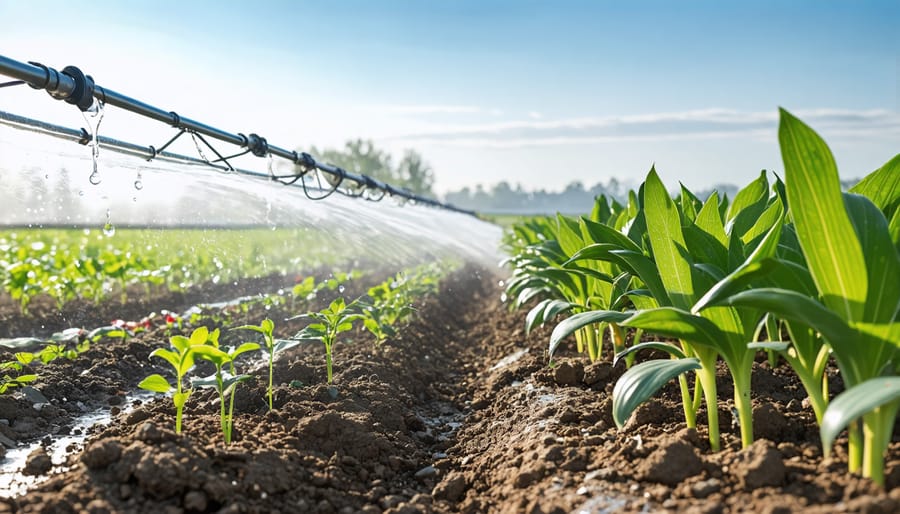
Water Conservation Techniques That Save Money
In Alberta’s semi-arid climate, smart water management isn’t just environmentally responsible – it’s a crucial cost-saving strategy. Local farmers have found success with precision irrigation systems that use soil moisture sensors to deliver water only when and where crops need it, reducing water usage by up to 30% while maintaining yields.
Drip irrigation has proven particularly effective for market gardeners in the Lethbridge area, with some reporting water savings of 40-50% compared to traditional sprinkler systems. These systems, while requiring an initial investment of $2,000-3,000 per hectare, typically pay for themselves within two to three growing seasons through reduced water bills and improved crop quality.
Another cost-effective approach gaining traction is rainwater harvesting. A 10,000-litre collection system costs approximately $5,000 to install but can provide free irrigation water for up to half a hectare of crops throughout the growing season. Medicine Hat farmer Sarah Thompson implemented this system in 2021 and reported annual water savings of $1,200.
Mulching with locally-sourced materials like straw or wood chips helps retain soil moisture, reducing irrigation needs by up to 25%. This practice costs roughly $200 per hectare annually but delivers additional benefits through weed suppression and soil improvement.
Consider joining local water stewardship groups that share resources and knowledge about water-efficient farming practices. The Alberta Irrigation Districts Association offers free workshops and consulting services to help farmers optimize their water use while maximizing profits.
Soil Health Improvements That Pay Off
Investing in soil enhancement practices isn’t just good for the environment – it’s good for your bottom line. Alberta farmers who have implemented strategic soil health improvements report significant financial returns within 2-5 years of adoption.
Take the case of Sarah Thompson, a third-generation farmer near Lethbridge, who saw a 15% reduction in fertilizer costs after implementing cover cropping and minimal tillage practices. Her soil organic matter increased from 2% to 4% over three years, leading to better water retention and reduced irrigation needs.
The numbers tell a compelling story across the province. Farmers utilizing soil health practices report:
– 20-30% reduction in input costs
– Up to 40% less water usage
– Increased crop resilience during drought years
– Premium prices for crops grown in healthier soils
– Carbon offset credits through provincial programs
Local soil testing services show that farms implementing these practices typically see a return on investment of $2-3 for every dollar spent on soil improvements. The key is starting with basic improvements like reducing tillage and adding organic matter, then gradually expanding to more advanced practices as your soil health develops.
Many Alberta agricultural extension offices offer cost-sharing programs for soil testing and improvement initiatives, making it easier to begin your soil health journey while managing upfront costs.
Making the Transition: Support and Resources
Financial Incentives and Programs
Canadian farmers looking to transition to eco-agricultural practices can access numerous available funding and support programs designed to ease the financial burden of implementation. The Canadian Agricultural Partnership (CAP) offers cost-sharing opportunities for environmental improvements, with funding covering up to 70% of eligible projects.
In Alberta, the Environmental Stewardship and Climate Change Producer Program provides grants ranging from $2,000 to $100,000 for initiatives that enhance soil health, water management, and biodiversity. Farmers can also benefit from the Agricultural Clean Technology Program, which supports the adoption of green technologies with funding up to $2 million per project.
Local agricultural societies and conservation authorities often provide additional micro-grants and technical support for smaller-scale initiatives. The Alternative Land Use Services (ALUS) program compensates farmers for maintaining ecosystem services on their land, offering annual payments between $15 and $150 per acre depending on the project type.
Tax incentives are available through the Scientific Research and Experimental Development (SR&ED) program for farmers implementing innovative ecological practices. New farmers can access start-up funding through FarmStart and Young Agrarian programs, which specifically support sustainable agriculture initiatives.
Remember to consult with local agricultural extension offices and environmental organizations, as they often provide valuable guidance in navigating these funding opportunities and application processes.
Technical Support Networks
Alberta’s agricultural community benefits from a robust network of technical support and expertise designed to help farmers transition to eco-friendly practices. The Alberta Agriculture and Forestry department offers free consultations with agronomists who specialize in sustainable farming methods, while regional Agricultural Service Boards provide local support and guidance tailored to specific areas.
Training opportunities are readily available through various channels. The Environmental Farm Plan workshops, offered throughout the year, provide hands-on learning experiences in soil health management, water conservation, and biodiversity enhancement. These sessions are typically held at demonstration farms where participants can see eco-agricultural practices in action.
The Prairie Organic Development Fund facilitates mentor-mentee relationships between experienced organic farmers and those new to sustainable practices. This program has proven particularly successful, with over 200 successful partnerships established in the past five years.
Digital resources complement in-person support through webinars and online courses offered by institutions like Olds College and Lakeland College. The Canadian Organic Growers association maintains an extensive online library of case studies and best practices specific to our climate and growing conditions.
Local agricultural societies regularly host field days and workshops, creating opportunities for peer-to-peer learning and community building. These events often feature successful local farmers sharing their experiences with ecological farming methods, making the transition more approachable for others in the community.
Building Tomorrow’s Farm Today
Next Steps for Your Farm
Ready to take your farm in a more sustainable direction? Start with a three-month transition plan that builds momentum while managing risks. Begin by soil testing and mapping your land to establish your baseline. In the first month, implement one new eco-friendly practice, such as cover cropping or rotational grazing, on a small test plot of 1-2 hectares.
During month two, connect with local farming networks and attend workshops through Alberta’s agricultural extension services. Consider joining a mentorship program – many experienced eco-farmers in our region are eager to share their knowledge. This is also the time to research available grants and funding opportunities through provincial sustainability programs.
By month three, develop your full implementation timeline, focusing on practices that align with your farm’s unique needs. Consider starting with low-cost, high-impact changes like improving water management or establishing beneficial insect habitats. Document your progress with photos and detailed notes – this will be invaluable for fine-tuning your approach.
Remember, successful transition to eco-agriculture is a journey, not a race. Start small, measure your results, and scale up what works for your specific situation.
Connecting with Your Farming Community
Building strong connections within your farming community is essential for advancing eco-agriculture practices in Alberta. Start by joining local agricultural associations and attending field days hosted by organizations like the Alberta Conservation Association. These events provide excellent opportunities to network with fellow farmers who are already implementing sustainable practices.
Consider participating in mentorship programs through Alberta’s Agricultural Research and Extension Council. Many experienced eco-farmers are eager to share their knowledge and support newcomers in their transition to sustainable methods. Regular attendance at farmers’ markets can also help you connect with like-minded producers and learn about local initiatives.
Social media platforms, particularly Facebook groups focused on Canadian regenerative agriculture, offer valuable virtual networking opportunities. Join online communities such as “Alberta Sustainable Farmers” to share experiences and ask questions.
Take advantage of workshops and training sessions offered by agricultural extension services. The Environmental Farm Plan workshops, for instance, not only provide valuable information but also create spaces for farmers to meet and exchange ideas about sustainable practices.
Don’t forget to engage with your local Agricultural Service Board. These boards often coordinate community-based environmental initiatives and can connect you with resources and funding opportunities specific to your region.
The transition to eco-agriculture isn’t just a distant dream – it’s happening right here in Alberta, driven by farmers like you who are taking steps toward sustainable practices every day. From Medicine Hat to Grande Prairie, we’re seeing successful examples of farmers working together to implement change while maintaining profitable operations.
Remember, you don’t have to transform your entire operation overnight. Start with one practice, whether it’s introducing cover crops or implementing rotational grazing. Each small step contributes to the larger goal of sustainable agriculture and helps build resilience in our farming communities.
Local agricultural associations and extension services are ready to support your journey. Connect with neighbouring farmers who have already adopted eco-friendly practices – they’re often eager to share their experiences and lessons learned. The Alberta Farm Sustainability Extension Working Group and various regional agricultural societies offer workshops, funding opportunities, and mentorship programs specifically designed for transitioning to sustainable practices.
Together, we’re building a stronger, more sustainable agricultural future for Alberta. The tools, knowledge, and support systems are in place – all that’s needed is your commitment to take that first step. Whether you’re managing a small family farm or a large operation, the path to eco-agriculture is open to everyone, and our farming community is here to support you every step of the way.
Join the growing network of Alberta farmers who are proving that eco-agriculture is not just environmentally responsible – it’s economically viable and community-strengthening. Your journey toward sustainable farming practices starts today.

